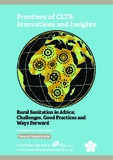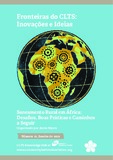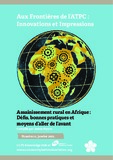Rural Sanitation in Africa: Challenges, Good Practices and Ways Forward
Saneamento Rural em África: Desafios, Boas Práticas e Caminhos a Seguir;
Assainissement rural en Afrique : Défis, bonnes pratiques et
moyens d’aller de l’avant
| dc.contributor.author | Myers, Jamie | |
| dc.date.accessioned | 2019-02-08T12:36:47Z | |
| dc.date.available | 2019-02-08T12:36:47Z | |
| dc.date.issued | 2019-01 | |
| dc.identifier.citation | Myers, J. (2018) Rural Sanitation in Africa: Challenges, Good Practices and Ways Forward, Frontiers of CLTS: Innovations and Insights 12, Brighton: IDS, CLTS Knowledge Hub | en |
| dc.identifier.citation | Myers, J. (ed.) (2019) «Saneamento Rural em África: Desafios, Boas Práticas e Caminhos a Seguir», Fronteiras do CLTS: Inovações e Ideais 12, Brighton : IDS | pt |
| dc.identifier.citation | Myers, J. (ed.) (2019) « Assainissement rural en Afrique : Défis, bonnes pratiques et moyens d’aller de l’avant », Aux Frontières de l’ATPC : Innovations et Impressions 12, Brighton : IDS | fr |
| dc.identifier.isbn | 978-1-78118-509-4 | |
| dc.identifier.uri | https://opendocs.ids.ac.uk/opendocs/handle/20.500.12413/14325 | |
| dc.description.abstract | In order to achieve universal safely managed sanitation across Africa by 2030 the scale and pace will need to increase drastically. With this in mind, in the run up to AfricaSan 5, the CLTS Knowledge Hub based at the Institute of Development Studies co-convened two regional rural sanitation workshops. Both events brought together those engaged in rural WASH programmes from different countries across the continent alongside experts working at regional and global levels. The first held in Arusha, Tanzania, April 2018, brought together stakeholders from eight countries across East and Southern Africa. The second held in Saly, Senegal, June 2018, was co-convened with WaterAid, WSSCC and UNICEF with support from AGETIP and had representatives from 14 countries across West and Central Africa. The aim of both events was to rejuvenate inter-organisational, inter-country regional sharing and learning and build consensus on ways forward in the run up to AfricaSan and beyond. This edition of Frontiers of CLTS draws on the discussions held across both these events. It begins by highlighting the challenges faced by programme implementers (both government and non-government staff) at different levels in relation to the Ngor Commitments and the achievement of universal access to safely managed sanitation. A range of initiatives are then presented that show promise in addressing these challenges – it is designed to be read like a catalogue of ideas which can inspire and be adapted to different country contexts. The issue ends with recommended priority actions. | en |
| dc.description.abstract | Tem-se registado um progresso considerável nas áreas rurais, através do Saneamento Total Liderado pela Comunidade (Community-Led Total Sanitation, CLTS) e outras abordagens de saneamento rural que devem ser aplaudidas. Nalguns países, estamos a observar resultados em toda uma área com intervenções baseadas na comunidade, por exemplo, províncias no Quénia, municípios na Zâmbia e circunscrições autárquicas na Nigéria, todos eles Livres de Fecalismo a Céu Aberto (Open Defecation Free, ODF). Os Objectivos de Desenvolvimento Sustentável (ODS) vieram, porém, fazer subir as exigências relativamente à cobertura e ao nível de serviço necessário. Muitas estratégias nacionais para o CLTS foram criadas na era dos Objectivos de Desenvolvimento do Milénio, sendo necessário revê-las de modo a terem em conta a mudança de enfoque dos ODS, os Compromissos de Ngor (ver página 3) e a melhor compreensão que o sector actualmente tem de questões como a equidade e a sustentabilidade. | pt |
| dc.description.abstract | Pour arriver à un assainissement universel géré de manière sûre dans toute l’Afrique d’ici à 2030, il faut augmenter massivement la vitesse et l’ampleur des progrès accomplis. Sachant cela, en préparation de l’AfricaSan 5, la CLTS Knowledge Hub basée à l’Institute of Development Studies a coorganisé deux ateliers régionaux sur l’assainissement rural. Les deux événements ont réuni les personnes impliquées dans des programmes d’EAH en milieu rural dans différents pays du continent aux côtés d’experts travaillant aux niveaux régional et mondial. Le premier atelier, soutenu par la SNV, s’est déroulé à Arusha, en Tanzanie, du 16 au 20 avril 2018, et il a réuni les parties prenantes de huit pays d’Afrique de l’Est et australe1. Le second s’est tenu à Saly, au Sénégal, du 25 au 28 juin 2018, et il était coorganisé avec WaterAid, le WSSCC et l’UNICEF avec le concours de l’AGETIP ; il a réuni des représentants de 14 pays d’Afrique de l’Ouest et du Centre2. Le but des deux manifestations était de redynamiser le partage et l’apprentissage interorganisationnels et inter-pays à l’échelle régionale et d’arriver à un consensus sur les moyens d’aller de l’avant à l’approche de l’AfricaSan et audelà. | fr |
| dc.description.sponsorship | SIDA | en |
| dc.language.iso | en | en |
| dc.publisher | Institute of Development Studies | en |
| dc.relation.ispartofseries | Frontiers of CLTS;12 | |
| dc.rights.uri | http://creativecommons.org/licenses/by-nc-nd/3.0/ | en |
| dc.subject | Health | en |
| dc.title | Rural Sanitation in Africa: Challenges, Good Practices and Ways Forward | en |
| dc.title | Saneamento Rural em África: Desafios, Boas Práticas e Caminhos a Seguir | pt |
| dc.title | Assainissement rural en Afrique : Défis, bonnes pratiques et moyens d’aller de l’avant | fr |
| dc.type | Series paper (non-IDS) | en |
| dc.rights.holder | © Institute of Development Studies 2019 | en |
| rioxxterms.funder | Default funder | en |
| rioxxterms.identifier.project | Default project | en |
| rioxxterms.version | NA | en |
| rioxxterms.funder.project | 9ce4e4dc-26e9-4d78-96e9-15e4dcac0642 | en |




